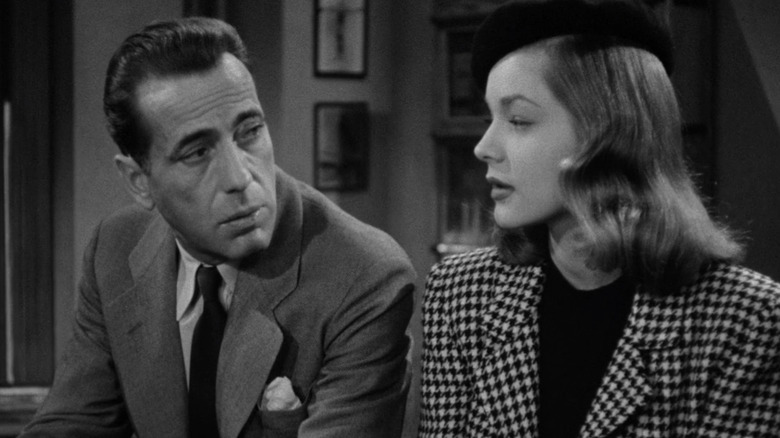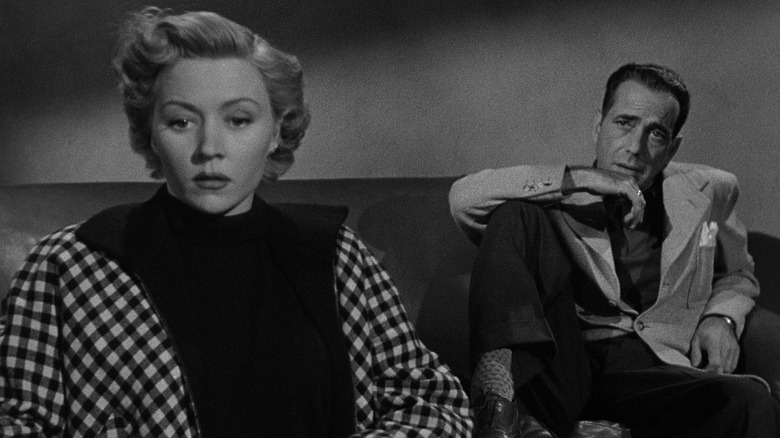Warner Bros. Used Lauren Bacall's Contract To Get Revenge On Humphrey Bogart
We may receive a commission on purchases made from links.
The Golden Age of Hollywood gave us a plethora of phenomenal acting pairs that would appear together in film after film. We had Ginger Rogers and Fred Astaire, Spencer Tracy and Katharine Hepburn, Bob Hope and Bing Crosby, and many more. In a time where franchises and intellectual properties were not ruling Hollywood, pairing two actors together again was its own form of franchising. They were similar kinds of movies, but each told different stories with the actors playing different characters. The chemistry was all you needed to get people to come back for more.
One of the best pairings of the era was obviously Humphrey Bogart and Lauren Bacall. Not only were both of them phenomenal actors who had scintillating on-screen chemistry, but there was also the added factor that the two became a couple and were married until Bogart's death in 1957. Over the course of their partnership, they made four movies together between 1944's "To Have and Have Not" and 1948's "Key Largo." They were a crown jewel couple at Warner Bros.
Considering they were together for another nine years, you would assume they would have been in the same film again. Well, they certainly wanted to be, but this was the time of the studio system. Actors signed exclusive contracts with Hollywood studios and were not allowed to work on an outside project unless their employed studio approved it. After "Key Largo," Bogart's contract with Warner Bros. was up, and he decided not to negotiate a new one with them, opting instead to go out on his own. Consequently, the film that ended up containing arguably Bogart's greatest performance on screen in "In a Lonely Place" was unable to bring in Bacall to star alongside him.
In A Lonely Place is an apt title
Once Humphrey Bogart's contract with Warner Bros. was up, he did not decide to sign a deal with MGM, Fox, or one of the other studios. Instead, he started his own production company called Santana Productions. This gave Bogart a freedom to make the projects he wanted to without the pressure from a studio. However, having a production company doesn't get your films distributed, and instead of making a deal with Warner Bros. for that — where he had spent his career since the early 1930s and became the king of film noir – he went to Columbia Pictures. According to the book "Tough Without a Gun: The Life and Extraordinary Afterlife of Humphrey Bogart," studio head Jack Warner was none too pleased about what he saw as throwing loyalty in the garbage.
Though Bogart was finished with his Warner contract, Lauren Bacall was not. She had the power of script approval, but that was only for movies within the WB system. If she was going to do something else, she needed Jack Warner's approval. Bogart may have wanted Bacall to play the role of Laurel Gray in Nicholas Ray's "In a Lonely Place," but Warner was never going to let that happen due to the studio-jumping betrayal.
In the end, Gloria Grahame took on the role as the aspiring actress who starts a relationship with Bogart's alcoholic screenwriter Dix Steele. Dramatically, I think this was actually the smarter move, because we have no history between Bogart and Grahame, making the combustions of that relationship over the course of the film far more unpredictable. We know Bogart and Bacall belong together, and a movie literally called "In a Lonely Place" can't have that kind of safety net.

